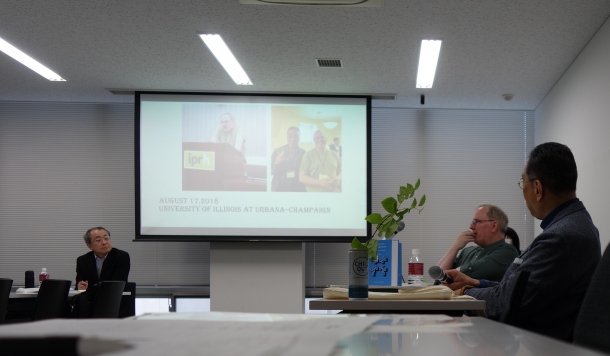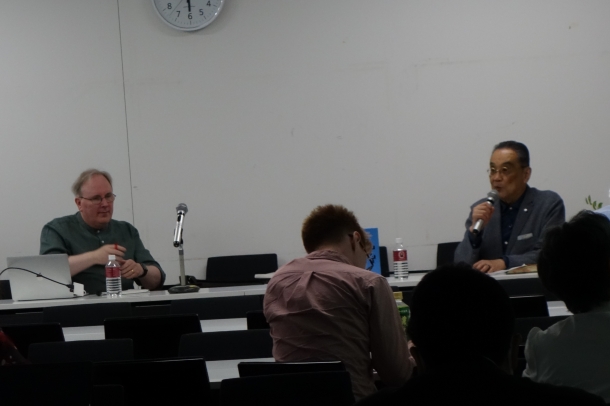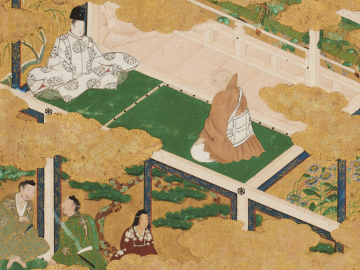The Global Japanese Studies Model Unit organized the lecture “Confusion over Cathay: Attitudes to Sinitic Material in Medieval Japanese Poetry and Poetic Criticism from the Poetry Contest in Six Hundred Rounds” by Dr Thomas McAuley (Senior Lecturer, The University of Sheffield).

On June 7, 2023, a lecture by Dr Thomas McAuley (Senior Lecturer, The University of Sheffield) was held at the Toyama Campus of Waseda University. Dr McAuley is a scholar of classical Japanese literature, particularly Japanese waka poetry, and has made outstanding achievements in its research and translation into English. In particular, he spent about 10 years working on the complete translation of Roppyakuban uta’awase, which is regarded as the best of the numerous Japanese poetry competitions, and published it as The Poetry Contest in Six Hundred Rounds (two volumes) in 2020 (Brill). He is also eager to share the results of his research and translation of Japanese poetry with a wide range of people, and thus he has also been active in promoting the English translations of Japanese poetry through a variety of media and opportunities.
Since March 2023, Dr McAuley has been on a sabbatical leave at Waseda University, supported by a Japan Foundation Fellowship, to study Japanese poetry and its theory. As such, he gave a lecture entitled “Confusion over Cathay: Attitudes to Sinitic Material in Medieval Japanese Poetry and Poetic Criticism from the Poetry Contest in Six Hundred Rounds.” The lecture focused on the judgements (“hanshi)” written by Fujiwara no Shunzei (1114-1204), the judge of the contest, and the Appeal (chinjō) written by Kenshō (ca. 1130-1209), one of the participants in the contest who disagreed with Shunzei’s judgments about his poetry. Dr McAuley mainly used Japanese in his lecture, reading the original text and then adding his own English translations for the poems and judgements quoted from The Poetry Contest in Six Hundred Rounds.

In his lecture, Dr McAuley first gave an overview of The Poetry Contest in Six Hundred Rounds and then presented the criteria for judging the quality of the poems in the poetry contest. Then, he discussed a number of poems containing expressions derived from ‘Cathay’ (Chinese poetry and Chinese classics) in The Poetry Contest in Six Hundred Rounds, and carefully explicated the criticisms made by Shunzei, the judge, of each of these poems. Dr McAuley concretely demonstrated that Shunzei was generally critical of the use of expressions related to Chinese poetry or Chinese historical events in waka poetry, and was particularly harsh on Kenshō’s poems. In addition, Dr McAuley also revealed that Kenshō was equally harsh in his criticisms of Shunzei’s judgements, even going so far as to call him an “unenlightened man” in his “Appeal.” However, Dr McAuley also noted that Shunzei’s attitude toward ‘Cathay’ was not always critical, but rather complex and sometimes contradictory. In any case, he concluded that Shuzei’s basic stance was that poets should avoid excessive usage of material originating in China and to emphasize the importance of only using it if it had a close relationship with the set theme of their poems.
At the end of the lecture, also Dr McAuley introduced aspects of his own Japanese poetry promotion activities.
 Next, commentator Prof. Nobuyuki Kanechiku (Waseda University) summarized the main points of the lecture and explained the difficulties in Shunzei’s judgements, referring to previous studies by Shigeo Yasui and others. Professor Kanechiku also discussed the fact that members of the Kujō family, including Kujō Yoshitsune, the organizer of the Poetry Contest in Six Hundred Rounds, and his elder brother Yoshimichi were experts in Chinese poetry (kanshi), as well as the difficulties in sharing Chinese-derived historical events at that time, as seen in Karamonogatari and other works.
Next, commentator Prof. Nobuyuki Kanechiku (Waseda University) summarized the main points of the lecture and explained the difficulties in Shunzei’s judgements, referring to previous studies by Shigeo Yasui and others. Professor Kanechiku also discussed the fact that members of the Kujō family, including Kujō Yoshitsune, the organizer of the Poetry Contest in Six Hundred Rounds, and his elder brother Yoshimichi were experts in Chinese poetry (kanshi), as well as the difficulties in sharing Chinese-derived historical events at that time, as seen in Karamonogatari and other works.
 Professor Kanechiku then led a discussion between Dr McAuley and the floor. Fittler Aron, Loren Waller, Kimiko Kono, and Kazuhiko Kobayashi (in the order of their comments) remarked on translating Japanese poetry, the relationship between Japanese poetry and Chinese poetry and Chinese classics, the complexity of Fujiwara no Shunzei, a great poet, and the relationship with the Rokujō Tō family, and exchanged views with Dr McAuley.
Professor Kanechiku then led a discussion between Dr McAuley and the floor. Fittler Aron, Loren Waller, Kimiko Kono, and Kazuhiko Kobayashi (in the order of their comments) remarked on translating Japanese poetry, the relationship between Japanese poetry and Chinese poetry and Chinese classics, the complexity of Fujiwara no Shunzei, a great poet, and the relationship with the Rokujō Tō family, and exchanged views with Dr McAuley.
At the end, Professor Kanechiku, under his pen-name as a tanka poet, Uōsaō, recited a poem in praise of Dr McAuley to bring the lecture to a close:
| totsukuni no hito mo yomitoku mumomochi no tsugai no uta zo okashikarikeru |
A distant land has birthed One who grasps the heart Of all six hundred Rounds of poem— What a delight! |

Event Overview
- Date and time: June 7, 2023, 17:00 – 18:20 (JST)
- Language: Japanese and English
- Lecturer: Dr Thomas McAuley (Senior Lecturer, The University of Sheffield).
- Venue: Conference Room 1, 3rd Fl. Building 33, Toyama Campus, Waseda University
- Participation is free
- Registration: Not required
- Schedule
17:00-17:05 Opening remarks: Hidenori Jinno (Professor, Waseda University)
17:05-17:50 Thomas McAuley (Senior Lecturer, The University of Sheffield)
17:50-18:05 Comment: Nobuyuki Kanechiku (Professor, Waseda University)
18:05-18:18 Q & A session
18:18-18:20 Closing remarks: Hidenori Jinno (Professor, Waseda University)








